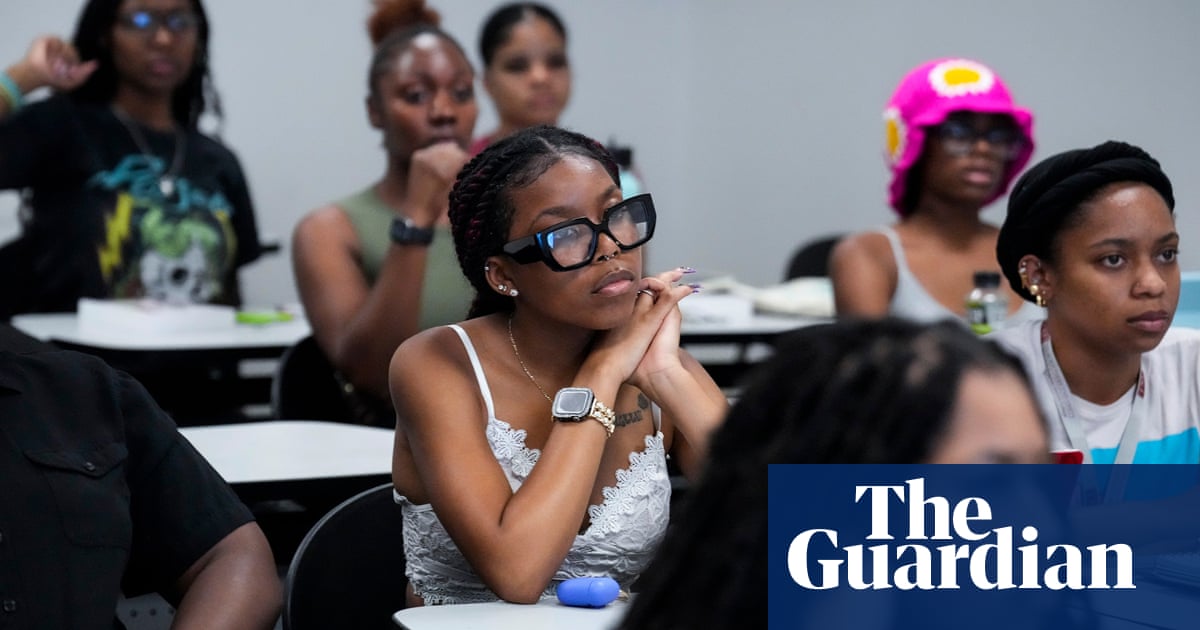As part of a sweeping crackdown on both undocumented and legal immigrants, Donald Trump signed an executive order on Monday trying to end the right to citizenship for some children born in the United States.
In a country where birthright citizenship regardless of lineage is a deeply held value, the president’s attempt to cut off that right for future generations could create a permanent underclass, through policy change that would specifically target communities of color.
His executive order will likely face court challenges from civil rights organizations, which have favorable constitutional language and over a century of legal precedent on their side.
Here’s more on the right to birthright citizenship and its future under the Trump administration.
What is birthright citizenship?
When Trump and his allies reference birthright citizenship, they’re usually alluding to the legal principle of jus soli – which means “right of the soil” in Latin. Put simply, it allows nearly everyone born on US soil to become a US citizen.
What is the legal basis for birthright citizenship in the US?
As a concept, jus soli comes from English common law, which held centuries ago that people born in England were natural subjects.
But unrestricted birthright citizenship in the US that includes people of color – not just white Americans – derives from the US constitution. In 1857, the supreme court ruled that Black descendants of enslaved people could not be US citizens. To right this injustice, just over a decade later, the US ratified the 14th amendment.
The first line of the 14th amendment reads: “All persons born or naturalized in the United States, and subject to the jurisdiction thereof, are citizens of the United States and of the State wherein they reside.” Known as the Citizenship Clause, this phrase – alongside a number of related statutes and regulations – establishes the modern basis for birthright citizenship.
What have US courts said about birthright citizenship for the children of immigrants?
Even as the 14th amendment was ratified, Americans were starting to turn against immigrants in the US, especially Chinese workers. Soon, Congress had enacted legislation to heavily restrict further Chinese migration and make life difficult for those already stateside.
Wong Kim Ark, a young man born in San Francisco to immigrant parents, went to China to see his family. When he tried to return home to the US, he wasn’t allowed into the country based on allegations that he wasn’t a US citizen.
But the supreme court saw the situation differently. In an 1898 precedential decision that has withstood the test of time, the justices ruled in favor of Wong Kim Ark’s US citizenship claim even though his parents were Chinese immigrants unable to naturalize.
Who is not a US citizen, even if they’re born in the US?
There are exceedingly rare exceptions to the principle of jus soli, where people born in the US are not automatically granted US citizenship.
Until the enactment of a law in 1924, Indigenous peoples born in the US were excluded. In 2021, the supreme court decided that people born in American Samoa’s unincorporated territories are not automatically guaranteed birthright citizenship, unless Congress enacts legislation. And the children of foreign diplomats – or, in a more violent scenario, the kids of enemy occupiers – also lack a right to US citizenship by birth.
Do other countries have birthright citizenship like in the US?
In comments criticizing the US’s version of birthright citizenship, Trump has said: “We have to end it. We’re the only country that has it.”
In fact, dozens of countries have a right to citizenship based on place of birth. Like the US, most of these countries are within the Western hemisphere, including Canada and Mexico. That said, birthright citizenship is less common in other regions of the world.
What does Trump’s executive order do?
The executive order signed on Monday tries to make it so that children born in the US, but without at least one parent who is a lawful permanent resident or US citizen, are no longer automatically extended US citizenship.
It also disallows federal agencies from issuing or recognizing documentation proving US citizenship for such children.
Notably, the executive order targets kids born to both unauthorized immigrants and people legally in the US on temporary visas.
Could Trump actually end birthright citizenship?
Maybe – although likely not, and almost definitely not through executive order.
The Citizenship Clause is part of the US constitution, the nation’s founding document. Generally, legal scholars strongly suggest that neither executive action nor legislation should be able to supersede the constitution’s guarantee of birthright citizenship for those born on US soil.
However, because the legal precedent set by Wong Kim Ark well over a century ago is so fundamental to how birthright citizenship relates to the children of immigrants, a court battle erupting from Trump’s executive order could – in the most extreme scenario – jeopardize the US’s understanding of birthright citizenship as we know it.
In fact, forcing the supreme court to reinterpret the 14th amendment is likely part of the long game that the Trump administration is playing with its executive order. Yet even with the White House raring for a fight, a complete overhaul of case law around birthright citizenship remains improbable.
The other way to override an existing part of the constitution would be to ratify another amendment, which would require a level of political support that is unlikely for such a fringe, rightwing issue.
How else could the Trump administration police birthright citizenship?
Even if the administration is unable to completely undo birthright citizenship for the children of certain immigrants, officials have reportedly been exploring other ways to tackle the topic. For instance, they could try to restrict short-term visas for pregnant travelers, so those travelers couldn’t give birth in the US.

 German (DE)
German (DE)  English (US)
English (US)  Spanish (ES)
Spanish (ES)  French (FR)
French (FR)  Hindi (IN)
Hindi (IN)  Italian (IT)
Italian (IT)  Russian (RU)
Russian (RU)  4 hours ago
4 hours ago
























Comments